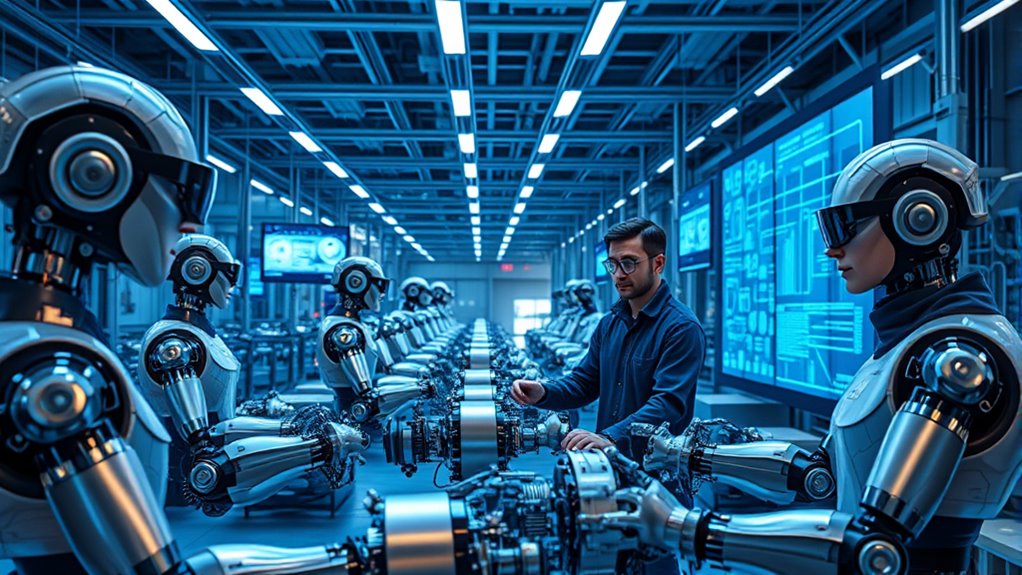Germany’s AI push is transforming its economy across all sectors. With a 36% growth in AI startups and over 90% survival rates, innovation is thriving. Companies are adopting AI for efficiency, gaining a competitive edge, and creating new market opportunities. Public trust is high, and investments are increasing, fueling long-term growth. If you explore further, you’ll discover how this AI revolution is shaping Germany’s future and global competitiveness.
Key Takeaways
- Germany’s growing AI startup ecosystem, with 935 firms and a 90% survival rate, drives innovation across industries.
- Widespread AI adoption enhances efficiency and competitiveness, shaping strategic business models nationwide.
- Public acceptance and increasing AI investments accelerate integration into daily life and various sectors.
- The expanding AI market, projected to reach €10 billion by 2025, fuels economic growth and new business opportunities.
- AI’s transformative impact prompts workforce adjustments, fostering long-term innovation and digital competitiveness.

Germany is rapidly transforming its economy through an aggressive push into artificial intelligence, reshaping innovation across every sector. The AI startup landscape is booming, with a remarkable 36% growth in 2025, bringing the total to 935 startups. This trend mirrors previous years’ rapid expansion, indicating a thriving environment for AI-driven innovation. Most of these startups demonstrate high quality, boasting strong business models and internal AI expertise. The high survival rate of over 90% shows resilience and solid foundations, although about one in ten startups still exit the scene primarily through bankruptcy. This indicates that while opportunities are plentiful, only the most robust ventures succeed in this competitive landscape.
Germany’s AI startup scene is thriving with 36% growth in 2025 and a 90%+ survival rate, highlighting resilience in a competitive market.
Generative AI adoption is gaining serious traction across the German economy. Companies increasingly recognize its potential for innovation and competitive advantage. Still, only around 6% have formal AI strategies in place, revealing significant room for growth. Businesses see AI as a vital tool for enhancing efficiency and staying ahead in the global race. As AI becomes more embedded, concerns around ethics and governance grow, prompting organizations to prioritize responsible AI use. Employee enablement has also become a key focus, as integrating AI tools into daily workflows requires retraining and upskilling workers to maximize value.
AI has become an integral part of everyday life for many Germans. About three out of four people use AI-powered search solutions more frequently than traditional methods, reflecting growing trust—64%, slightly above the global average. Younger generations favor AI tools for their convenience and speed, while older generations still rely on traditional search engines for in-depth research. This shift indicates that AI is not just a technological trend but a societal transformation that influences how people access information and make decisions. This societal shift is supported by increasing investments and public acceptance of AI technologies.
The economic impact of AI in Germany is substantial and accelerating. The AI market is projected to nearly triple—from 4.8 billion euros in 2022 to around 10 billion by 2025—driven by advancements and increased digital adoption. Companies that leverage AI report higher ROI and profitability, emphasizing its strategic importance beyond mere efficiency. AI is now shaping new business models, fostering innovation, and supporting long-term growth. As a result, future competitiveness hinges on AI adoption, with businesses seeking to capitalize on its transformative power.
While AI offers significant benefits, it also raises concerns about employment. Over a quarter of German companies expect job cuts in the next five years due to automation, though only a small number anticipate creating new roles. For now, most see AI as a way to boost productivity without immediate workforce reductions, but structural changes are inevitable. The full impact on employment will unfold gradually, requiring ongoing adaptation.
The German AI market is poised for continued growth, projected to reach US$13.65 billion by 2025. Key drivers include increased digital technology adoption and the convenience of online AI services. Across sectors, AI enhances customer experiences and streamlines operations through personalization and automation. Globally, investments in AI are surging, with an 18.7% increase from 2023 to 2024, especially in generative AI. These global trends are shaping Germany’s AI landscape, reinforcing its position as a leader in AI-driven innovation and economic transformation.
Frequently Asked Questions
How Does Germany’s AI Strategy Compare to Other European Countries?
You’ll find Germany’s AI strategy is similar to other EU countries in focusing on responsible development, infrastructure, and talent. However, Germany allocates less funding (€5.5 billion) compared to nations like France (€109 billion), prioritizing industrial AI over consumer-facing applications. While Germany’s research environment is strong, it struggles to attract global venture capital and fully convert research into commercial success, unlike some of its European counterparts.
What Ethical Considerations Are Involved in Germany’s AI Development?
You need to prioritize ethical considerations in Germany’s AI development, focusing on respecting human rights, privacy, and nondiscrimination. You should guarantee AI systems are transparent, fair, and accountable, with ongoing bias detection and mitigation. Incorporate ethical guidelines like the ForeSight project’s code of ethics, and maintain public trust by openly sharing data sources and decision processes. Human oversight and risk assessments are essential to prevent harm and uphold societal values.
How Is AI Impacting Employment in German Industries?
AI is shaping Germany’s job landscape like a sculptor chiseling away at a block of marble. You might see job cuts in industry and trade sectors, with over 27% of companies expecting reductions, especially in manufacturing. Yet, tech and service sectors are experiencing growth, and AI boosts productivity for employees with specialized skills. While some roles may shrink, others evolve, demanding new skills and adaptation from you.
What Role Do Startups Play in Germany’s AI Landscape?
Startups are central to Germany’s AI landscape, driving innovation across sectors like healthcare, industrial engineering, and mobility. You’ll see them developing cutting-edge AI tools, attracting significant investments, and fostering partnerships with academia. These startups help shape Germany’s unique “third way” approach, balancing ethical standards and innovation. By supporting and scaling new AI solutions, they accelerate Germany’s position as a leading hub for AI-driven growth and transformation.
How Is AI Integration Influencing Germany’s Education System?
AI integration is transforming Germany’s education system by enabling personalized learning and automating administrative tasks, which boosts efficiency. You’ll notice increased student engagement through immersive VR and AR experiences, making complex concepts easier to grasp. However, challenges like digital divides and gaps in AI literacy remain. As a result, government initiatives and private sector efforts are working to expand access and make certain there is more equitable, innovative education for all students.
Conclusion
As Germany continues to embrace AI, you’re witnessing a gentle transformation that promises a brighter future for all. This innovative journey isn’t just about progress; it’s about nurturing a world where possibilities bloom quietly but powerfully. By fostering this subtle evolution, you’re part of a movement that respects tradition while welcoming new horizons. Together, you’re helping craft a smarter, more connected tomorrow—an inspiring step toward a future filled with hope and promise.









